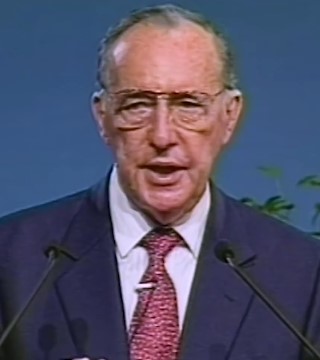Derek Prince - Not Enough Is Said About Repentance (08/22/2021)
Now, there can be a false repentance, which we in English today call remorse. Judas experienced that, described in Matthew 27. Verse 3 and following: Then Judas, the betrayer of Jesus seeing that he had been condemned, was remorseful, and brought back the thirty pieces of silver to the chief priest and elders, saying: I have sinned by betraying innocent blood. And they said, What is that to us? You see to it. Then he threw down the pieces of silver in the temple and departed and went and hanged himself. Judas had remorse but he never changed.
In fact, I believe he’d passed the point where he could change. And to me this is a solemn thought. People can in this life pass the point where it’s possible for them to change. I think the most significant moment in any human life is the moment when God begins to deal with you about repenting. And if you shrug your shoulders and say: Well, I’m not interested, maybe later. There’s no guarantee that God will ever deal with you again. The most critical moment in any human life is the moment when God says: Repent. I’m willing to take you back. I love you, I want you. I’ve considered what I’ve seen in people’s lives and in the Bible. I’ve come to the conclusion that there’s one thing that makes God really angry.
And it is despising His grace. He freely offers us His grace, but if we despise it He turns in anger. There’s one person who despised the grace of God. Do you know what his name was? Esau. And he’s described in Hebrews 12. I want to look at that passage for a moment, because there’s a lot of the Esau in people like you and me. We want to be careful that Esau doesn’t make our decisions. This is what it says in Hebrews 12, beginning at verse 14: Pursue peace with all men and holiness without which no one will see the Lord.
Notice that, without holiness no one will see the Lord. Looking diligently, lest anyone fall short of the grace of God, lest any root of bitterness springing up cause trouble, and by this many become defiled. Lest there be any fornicator, or profane or godless person like Esau who for one morsel of food sold his birthright. [Now we have no record whatever, that Esau ever committed fornication.] but his attitude in God’s eyes, was just as bad as fornication. What was his attitude? For one little bowl of soup he despised his birthright. He had the birthright as the elder son. All the inheritance could have gone to him. But just because he was physically hungry and could smell that delicious soup which Jacob had prepared...
This is very vivid to me because I lived amongst the Arabs for some time and they make exactly what Jacob made soup of lentils. They call it in Arabic surabit addis. And it has the most delicious smell, it permeates the house. And I can picture Esau coming back from his hunting, tired, hungry, and he just smells this delicious smell. And Jacob says, the bargainer that he was, listen, you sell me your birthright, I’ll give you the pottage, the soup. I’ll just take what I’ve got offered to me. And it says Esau despised his birthright. He made God extremely angry. And later on through the prophet Malachi God said: Jacob I have loved, Esau I have hated. That’s a very solemn thought.
If you deliberately despise the grace of God and the inheritance which He offers you in Jesus Christ, turn away for some cheap, temporary pleasure of this world, you make God very angry. And then it says, going on with that story: For you know that afterward when he wanted to inherit the blessing he was rejected, [rejected by God,] for he found no place of repentance though he sought it diligently with tears. Now the Greek makes it clear. He wasn’t seeking the place of repentance, he was seeking the blessing. But he was rejected because he found no place, no way to repent. And I do believe that in this life a person can pass the place of repentance and never be able to get back.
I want to urge upon you, this is a very, very solemn thought. Far too little is said today in many congregations and many denominations about the need for repentance. But without true repentance there can never be true faith. You’ll always have a wobbly up and down experience, in one day and out the next, because you haven’t laid the first foundation stone which is repentance. A decision of the will to turn away from self-pleasing and doing your own thing, to turn back to God, to face up to God, and say: God, here I am. Tell me what to do and I’ll do it. That’s repentance. There are some of you here today who have never truly repented. I want to suggest to you it’s the source of many of your problems. Your up and down experiences. You feel good one day, have a wonderful meeting in the church, you think it’s wonderful. The next morning something else happens and you’re down. You’ve never really laid the first foundation stone. All you have is a wobbly edifice which one day will collapse.

